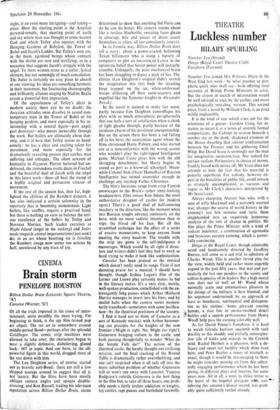Number Ten (Strand)
THEATRE
Luckless number
HILARY SPURLING
Dingo (Royal Court Theatre Club) Fanghorn (Fortune) Number Ten joined Mrs Wilson's Diary in the
West End last week—by what psychic or pro- phetic quirk who shall say—both offering rival accounts of British Prime Ministers in crisis.
But the citizen in search of information would be well advised to stick by the earlier, and more
psychologically revealing. version. This second piece, from a novel by William Clark, is au fond wildly implausible.
It is the kind of text which cries out for the attentions of a genius—Gordon Craig, for in- stance, to recast it as a series of severely formal compositions, the Cabinet in session beneath a sombre sky or the dank, shadowed crannies of the House dwarfing that sinister confrontation between the Premier and his gibbering Chief Whip. But David Scase is seemingly not the man for imaginative reconstruction. Nor indeed for surface realism. Perfunctory in choice of moves, frankly bored with noises off, Mr Scase does not attempt to hide the fact that his material is patently superficial. For nobody, however ex- pert in the banalities of public life, could remain
as strangely uncomplicated, as vacuous and vague as Mr Clark's characters interpreted by Mr Scase's cast.
Always excepting Alastair Sim who, with a spot of nifty blackmail and a narrowly averted war, changes the course of world history in the evening's last few minutes and turns them singkhanded into an exquisitely humorous analysis of the role of chance in politics. Mr Sim plays the Prime Minister with a kind of radiant indolence, a combination of egomania and ferocious nursery cunning, which is power- fully convincing.
Dingo at the Royal Court, though admirably acted and handsomely directed by Geoffrey
Reeves, will come as a sad trial to admirers of Charles Wood. This is another fervid plea for the view, widely held and rather more cogently argued in the past fifty years, that war and par- ticularly the last one panders to the vanity and callous hypocrisy of its leaders. But a high moral tone does not sit well on Mr Wood whose normally acute and uncensorious pleasure in the doings of the military is here blunted, and his argument undermined, by an approach at least as bombastic, sentimental and disingenu- ous as his victims'. Some pleasant rousing hymns, a nice line in smoke-swathed desert battles and a superb performance from Henry Woolf help pass the evening tolerably well.
As for David Pinner's Fanghorn, it is hard to watch Glenda Jackson succumb with such
docility to this shoddy and pitifully unimagina-
tive tale of kinks and wizards in the Cornish wild., Rachel Herbert is a pleasure, with a de-
lisacy and sweet tart lucidity which shine even here, and Peter Bayliss a tower of strength as usual, though it would be encouraging to think he might consider moving on from this admit- tedly engaging performance which he has been giving, in different plays and theatres, for some years now. All in all, a week to strike terror to the heart of the hopeful playgoer wit& sidering this autumn's dismal record, was prob- ably quite sufficiently rattled already.














































 Previous page
Previous page